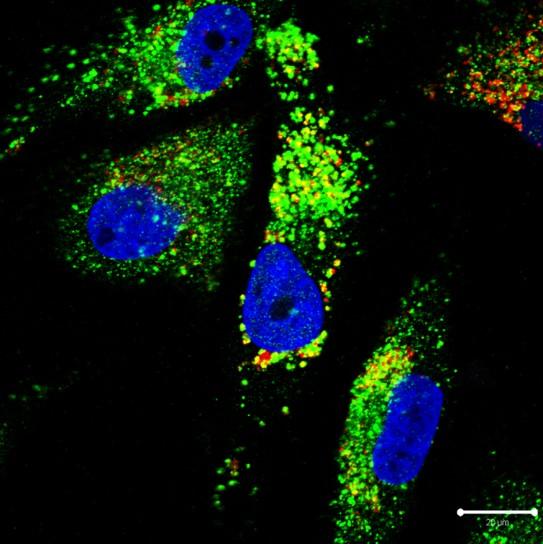
Credit: Courtesy of Boris Zhivotovsky.
During carcinogenesis malignant cells undergo uncontrolled division, causing the tumor dissemination. Target therapy is an actively developing area of cancer treatment. It includes blocking the action of certain proteins that are essential for controlling of tumor growth or activating non-functional proteins that control cell division. One of these proteins is a tumor suppressor (antioncogenic) protein p53 that is mutated in about 50% of all tumors. Using several new compounds it is possible to increase the activity of wild type p53. Some other compounds are able to reactivate mutated p53, making it more active and able to participate in the cancer cell suicide. These attempts are expected to be more efficient and less harmful for healthy cells.
The p53 tumor suppressor protein also known as "the guardian of the genome", supports the genetic stability of the cells and prevents the occurrence of malignant tumors. The protein is activated in response to damage of the genetic material, accumulated to a particular level, bound to the certain DNA regions and blocks the replication and the growth of "damaged" cells.
A team of researchers from MSU together with their Swedish colleagues showed that p53 also plays a role in the regulation of metastases formation. The protein regulates the expression of target genes by influencing various intracellular processes, including different types of programmed cell death such as apoptosis (cell breakdown into separate bodies that are phagocytized by macrophages or neighbouring cells), ferroptosis (cell death due to the iron-dependent oxidation of lipids), necroptosis (destruction of a cell by an activation of a specific intracellular complex called a necrosome), and autophagy.
Autophagy is a process of destruction of damaged cell organelles, proteins, and their complexes within the lysosomes. It helps cells adapt to stressful conditions and plays an important role in the formation and development of malignant tumors. Depending on the type of tumor, autophagy may either suppress the growth of cancer cells or support their survival and metastasis. Until recently a link between p53, autophagy and metastasis regulation has not been thoroughly studied.
Tatiana Denisenko, a research associate of the Faculty of Medicine, MSU, and Anastasiya Pivniuk, a graduate student of the faculty, analysed over 175 publications and found this link. They discovered that depending on the presence of either wild type or a mutated variant of the p53 protein in the tumor the autophagy might play a role in the regulation of various stages of metastasis. In particular, the protein regulates resistance of tumor cells to anoikis – death of cells that lost their interaction. The protein also influences activation and suppression of epithelial-mesenchymal transition, a process in the course of which epithelium cell acquire the qualities of mesenchyme, i.e. embryonic connective tissue. This process takes place during embryonic development, the healing of wounds, and pathological processes such as tumor growth. Moreover, the p53 protein regulates the cooperation between cancer cells and the extracellular matrix and their distribution over other tissues.
"It turned out that the role of p53, its target proteins, and autophagy in metastasis regulation is tissue-specific. It is determined by the type of tumor, molecular context, and several other processes. Therefore, it is so important to understand the mechanisms of metastasis on the molecular level and to identify its connection with cell death mechanisms. It would help also to predict the development of metastasis and increase the efficiency of target therapy. We have analysed several new compounds that are able to suppress metastasis. They can activate autophagy by means of specific targeting of the "p53-autophagy" link. Based on present information, all compounds are now on different stages of clinical trials for cancer therapy", concluded Boris Zhivotovsky, the lead author of the work, and the head of the laboratory for investigation of apoptosis mechanisms, Faculty of Medicine, MSU.
###
The study was carried out by a team of researchers representing the Faculty of Medicine, MSU and Karolinska Institutet (Sweden).
Media Contact
Yana Khlyustova
[email protected]
http://www.msu.ru
Related Journal Article
http://dx.doi.org/10.3390/cancers10050148




